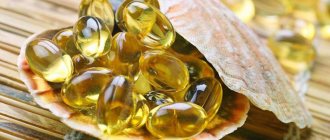To meet all the needs of a growing body, a nursing woman’s diet must be varied, balanced in protein, fat, carbohydrates, rich in vitamins and microelements, and have sufficient calorie content.
Omega-3 acids are an important component in the diet of a nursing mother, which is not always possible to obtain from food. Then synthetic additives come to the rescue.
Fats that enter the body with foods are represented, among other things, by polyunsaturated fatty acids (PUFAs). These include Omega-3 and Omega-6 fatty acids. These substances are not synthesized in the body and are ingested only with food or dietary supplements. Let's look at why and when you need to take additional Omega-3 while breastfeeding.
Fish oil in the postpartum period
After childbirth, women face a significant deficiency of vitamins, microelements and other substances beneficial to the body, since some of the nutrients are used to form breast milk. During breastfeeding, mothers are not advised to indulge in eating fatty fish, since it often contains mercury and other heavy metals, which are extremely dangerous for babies. Gynecologists and pediatricians agree that a nursing mother can drink fish oil, provided that the dosages and all doctor’s recommendations are followed.
Adequate nutrition and intake of all healthy vitamins is extremely important for restoring the physical and emotional state of a woman after childbirth, as well as for the health of the baby. It is difficult for a new mother to get important nutrients from food, because during breastfeeding there are significant restrictions in the diet. Therefore, many doctors recommend taking fish oil while breastfeeding in the form of supplements, not food. Such supplements contain essential fatty acids and essential fat-soluble vitamins necessary to maintain the mother’s body and the normal development of the baby. In order not to harm her child, a woman should know the dosage and rules for taking supplements.
Benefits for mother and baby
Omega-3 is a group of polyunsaturated fatty acids that are necessary for the body to form nerve fiber sheaths, cell membranes, and connective tissue. These substances are beneficial for mother and child. A person needs about 1-1.5 grams of Omega-3 per day.
Polyunsaturated fatty acids are used especially actively during lactation. Half of the daily value is transferred through breast milk to the baby. Therefore, a woman needs to increase her Omega-3 intake.
There are three types of polyunsaturated fatty acids:
- eicosapentaenoic acid;
- alpha-linoleic;
- docosahexaenoic.
A mother and her baby require the latter variety.
Benefits of Omega-3 for a woman’s body:
- improves the condition of arterioles and myocardium;
- reduces the likelihood of developing diabetes;
- reduces the risk of thrombosis;
- reduces bad cholesterol levels;
- stimulates brain function;
- improves the condition of joint tissue;
- promotes normalization of metabolic processes and weight loss;
- prevents postpartum depression, improves psycho-emotional state.
For a baby, the benefits of Omega-3 are as follows:
- promotes the formation of visual perception;
- ensures correct and timely development of the brain;
- improves abstract thinking, memory, increases concentration;
- prevents the development of infectious viral diseases, creating a barrier to the penetration of pathogenic microorganisms;
- strengthens the immune system;
- prevents the development of diathesis.
Signs of Omega-3 deficiency include the following:
- increased fragility of hair and nails;
- constant thirst;
- dryness of the epidermis;
- apathy;
- decreased concentration;
- poor wound healing;
- frequent constipation;
- increased blood pressure;
- pain in muscles, joints, tendons;
- a sharp decrease in immunity;
- deterioration in the quality of vision;
- decreased performance, fatigue;
- dandruff;
- the appearance of a rash on the skin.
Fish oil is a dietary supplement made from the liver of cod fish. Many adults perceive it as something tasteless and smelling bad. Fortunately, advanced pharmaceuticals offer us not only to drink liquid fish oil, familiar from childhood, but also to take its purified analogue in capsules.
The exclusivity of the product lies in the content of a large amount of vitamins (A, E, D, etc.) and fatty acids, without which the human body cannot fully function.
Vitamin A is essential for good vision. Together with vitamin E, it is responsible for the condition of nails, skin and hair (many mothers who breastfeed their children note a deterioration in their condition).
Vitamin D helps in the absorption of calcium and phosphorus, which are necessary to strengthen the teeth and bones of a nursing mother. If there is a deficiency of this vitamin in the body, rickets develops. The disease is also dangerous for a baby because only a doctor can notice it. The vitamin is especially important for “winter” children, since in the first months of their life they usually experience a lack of sunlight.
Separately, it should be said about the importance of fatty acids, which:
- stimulate fat metabolism and have a beneficial effect on digestive processes;
- have a positive effect on the development of the children's nervous system;
- promote the production of the hormone of joy - serotonin, and therefore serve as a prevention of depression in nursing women;
- eliminate inflammatory processes;
- form immunity in the baby and strengthen the protective forces of the mother’s body;
- reduce cholesterol levels and prevent the occurrence of heart and vascular diseases;
- help wound healing;
- necessary for the formation of nerve fibers, cell membranes and connective tissue;
- prevent the onset of diabetes.
Regular intake of fish oil by a woman during breastfeeding promotes lipid metabolism, which, in turn, helps to get rid of extra pounds that “settled” in the body during pregnancy.
The nutrition of a nursing mother affects the health of the baby. The mother should receive all the vitamins and minerals to pass on to the baby through milk, but at the same time adhere to the diet. Omega-3 is an important component necessary for the development of the baby, but is a mother allowed to drink omega-3 while breastfeeding?
Composition and biological role
The wide range of beneficial effects of the nutrient for the body is due to its rich chemical composition. The natural substance contains fat-soluble vitamins A, D, E, a complex of unsaturated fatty acids omega three and omega 6, antioxidants and microelements.
Dr. Komarovsky’s opinion on the benefits of fish oil and Omega acids (video):
Vitamin complex
Vitamin A (retinol) helps cope with hair loss and brittle nails, eliminates dryness and flaking of the skin in the mother. The substance penetrates into breast milk and ensures the proper development of the baby’s visual organs. Vitamin D (cholecalciferol) is necessary for regulating the metabolism of phosphorus and calcium in the body, preventing the destruction of tooth enamel in women. D3 is very important for the baby - it ensures the normal formation of skeletal bones and provides individual prevention of rickets.
Omega-3 fatty acids
PUFAs have a complex positive effect on a woman’s body: improves the rheological properties of the blood and lipid profile, normalizes blood pressure, and has anti-inflammatory and antioxidant effects. Omega 3 acids are essential for breastfeeding, they increase milk production and improve its nutritional value. DHA and EPA in fish oil are essential substances for the formation of the child’s brain and sensory organs.
For weight loss
After childbirth, mothers often face the problem of excess fat deposits and metabolic disorders. Omega three acids help normalize the metabolism of carbohydrates and fats, increase the sensitivity of cells to insulin and the absorption of glucose by the body. The substance accelerates metabolism and promotes weight loss. Polyunsaturated fatty acids are also responsible for the production of biologically active compounds that regulate the feeling of hunger and satiety.
To normalize the emotional state
A sufficient amount of DHA, contained in fish oil, is necessary for the normal functioning of mental processes. Supplements can help prevent the development of postpartum depression. The effect of acids on the emotional state is realized through an increase in the formation of active neurotransmitters (especially serotonin).
Contraindications and precautions
It is important to remember that uncontrolled and prolonged use of drugs containing Omega-3 can negatively affect the health of a woman and her baby. Therefore, it is necessary to follow the instructions and not exceed the recommended dose.
Taking Omega-3 may worsen the course of the following diseases:
- intestinal or stomach ulcer;
- chronic pathologies of the kidneys, gall bladder, liver;
- hypervitaminosis;
- hypercalcemia;
- thyroid disease.
With long-term use of drugs with polyunsaturated fatty acids, the fat content of milk can increase and stagnation in the mammary glands may occur. Therefore, while taking medications containing Omega-3, it is worth reducing the amount of fatty foods in the diet.
It is also likely that your baby will develop problems with the digestive tract: colic, upset stool. Allergic reactions in the form of an itchy red rash on the body are possible.
Among the side effects, women sometimes experience:
- decreased blood clotting;
- bad odor from the mouth;
- diarrhea.
You should stop taking Omega-3 in the following cases:
- individual intolerance to this substance by the body of a woman or her child;
- ulcerative pathologies;
- cholelithiasis and urolithiasis;
- endocrine disorders;
- organic myocardial diseases;
- hypothyroidism;
- disorders of the liver (fatty hepatosis, hepatitis);
- active form of tuberculosis;
- chronic renal failure.
To prevent the development of adverse reactions while taking Omega-3 drugs, doctors advise the following:
- start taking the medicine with the minimum dosage. This will make it clear how the child’s body reacts to the introduction of polyunsaturated fatty acids. If no negative symptoms appear during the first day, the dose of the drug can be increased;
- take suitable means;
- follow the rules for using the medicine specified in the annotation;
- do not take the drug for too long and in large doses;
- if adverse reactions occur, immediately discontinue Omega-3;
- stop taking medications containing polyunsaturated fatty acids in the first three months after birth. Newborns are weak and sensitive. Their digestive and immune systems are not formed. At this time, the baby’s fragile body may react to Omega-3 with allergies and gastrointestinal disorders.
When not to drink fish oil
Taking fish oil supplements is contraindicated in the following situations:
- the mother is allergic to the components of the composition;
- peptic ulcer of the stomach and duodenum;
- increased levels of calcium in the blood;
- pathologies of the urinary system and kidneys;
- hyperfunction of the thyroid gland;
- cholelithiasis.
Doctors recommend that mothers who have just given birth take special postnatal fish oil supplements, which simultaneously nourish the mother's body, but do not interfere with the composition of breast milk. To prevent your newborn baby from developing allergies or side effects, pay attention to the instructions for the drug so that it is not prohibited for use during breastfeeding, and do not try to compensate for the deficiency of the substance with fatty fish. The fact is that in addition to useful Omega acids and vitamins, you will also receive all the harmful components that are not found in pure supplements.
During this period, the digestive system of infants is not sufficiently developed, some enzymes are missing in the intestines, so the ingestion of nutrients from breast milk into the child’s body can cause dyspeptic disorders (diarrhea, colic, bloating). There is also a risk of developing allergic reactions to the components of fish oil, since in the first months of life the immune defense mechanisms of the newborn are significantly reduced.
When you should not take Omega-3 while breastfeeding and possible side effects of taking it
Like all medications and supplements, Omega-3 acids have positive effects and negative side effects.
The restrictions on prescribing the drug are as follows:
- exacerbation of chronic diseases of the stomach and intestines, accompanied by ulcers and bleeding;
- inflammation of the pancreas;
- chronic processes in the liver and biliary tract;
- allergic diseases;
- individual intolerance;
- endocrine diseases, including the thyroid gland;
- excess vitamin D;
- increased calcium levels in the blood.
Side symptoms are rare and appear from:
- digestive organs: dry mouth, abdominal discomfort, nausea, vomiting, loose stools;
- heart and blood vessels: decreased blood pressure;
- nervous system: dizziness, loss of attention, drowsiness.
Instructions for use
Prescribing medications with fish oil for breastfeeding should be approached very responsibly, since an overdose of the substance can be dangerous for both mother and baby.
Recommended dosages are no more than 1000 milligrams. Supplements must be taken for 30 days, then take a break for 3-4 weeks. If necessary, the course of drugs can be repeated. For the first time, a woman is allowed to drink only 1 capsule of the dietary supplement, and for 2 days carefully monitor the child’s condition. If there are no signs of an allergic reaction or digestive disorders, you can introduce supplements into your daily diet.
A nursing mother must follow these rules:
- limit the consumption of fatty fish and other seafood as much as possible;
- do not take other multivitamin complexes at the same time as fish oil;
- During the summer months it is better to refrain from taking supplements;
- You should not take dietary supplements for more than 1 month without a break, as this is fraught with the development of lactostasis.
Recommendations for mothers on how to take it correctly
Fish oil, as a source of Omega-3, is recommended to be consumed in capsule form. This will avoid affecting the taste and smell of the milk. First dose – 1 capsule. Then a break. It is necessary to observe the child to see if any allergy symptoms appear. Do not make any additional changes to your diet at this time.
If the reaction is satisfactory, you can continue to use Omega-3 (fish oil) 2-3 capsules per day. Your doctor will tell you the exact dosage.
Preparations with Omega-3 polyunsaturated fatty acids:
- Omega-3 Doppelhertz;
- Unique Omega-3;
- Solgar Omega-3 and others.
When choosing a drug, you need to pay attention to the composition.
Replenishing Omega-3 in the diet is equally beneficial for mother and child. In order for motherhood to bring only joy, you need to balance your diet, enrich it with useful nutrients, vitamins and, of course, Omega-3 fatty acids.
source
Choosing the right supplement and following the recommendations for taking fish oil while breastfeeding significantly reduces the occurrence of adverse reactions in mother and child.
When choosing, you need to pay special attention to quality. A salmon or cod capsule supplement that has undergone “molecular differentiation” or “distillation” is preferable.
- EPA and DHA content 15-60% of the daily value;
- the concentration of nutrients is from 600 to 1000 mg, with fewer acids you need to drink more capsules (from 2 to 15);
- manufacturer - it is better to choose a trusted company.
During breastfeeding, after consultation with a specialist, it is possible to use the following supplements: Omega-3 Trimester, Doppelhertz Active Omega-3, Solgar double Omega-3, Nature's Bounty Omega-3 and fish oil.
Taking any medications during breastfeeding must be agreed with your doctor. If the baby is bothered by colic, then it is advisable to postpone the use of fish oil until the child is 3-4 months old until the digestive system matures.
On the first day of taking the supplement, you should take the minimum dosage and monitor the baby’s condition for 2-3 days. It is not recommended to introduce new products at this time.
The duration of the course depends on the chosen form, on average it is 1-2 months. Breaks are necessary to prevent hypervitaminosis. The maximum dosage per day for a nursing woman is up to 1000 mg or 1 teaspoon. The use of capsules is preferable - they are odorless and unpleasant taste, and more convenient.
source
Best Supplements for Breastfeeding Moms
We have selected the TOP 3 dietary supplements with fish oil and polyunsaturated fatty acids from premium pharmaceutical companies. These preparations are distinguished by high quality raw materials, rich chemical composition and the absence of allergens. All of them have passed international quality certification and can be safely used during lactation.
Postnatal Omega-3, Nordic Naturals (USA)
Nordic Naturals, Postnatal Omega-3, Lemon, 650 mg, 60 Softgels
2 296 ₽
Buy at a discount
In a natural American preparation, omega 3 acids are obtained from pure anchovy fish oil, which undergoes several degrees of molecular purification. Per serving (2 capsules) contains 1120 milligrams of omega-3 acids, including 450 mg of DHA, as well as 1000 IU of vitamin D3. The supplement is available with a lemon flavor and aroma, which makes it easier to take. The manufacturer recommends drinking 1 capsule 2 times a day with food.
Pros: good composition, small capsule size, no aftertaste or fishy burps.
Cons: high cost.
DHA for nursing mothers, Carlson Labs (USA)
Carlson Labs, Nursing DHA, 500 mg, 120 Softgels
2 751 ₽
Buy at a discount
Docosahexaenoic acid is made from fish oil from sardines, mackerel, and anchovies. The product is officially recognized by the American Pregnancy Association as the best source of DHA for nursing mothers. One capsule contains 500 mg DHA and 100 mg EPA. Gynecologists advise drinking 1-2 capsules of the drug per day, during meals.
Pros: High DHA content per serving, no fishy taste or smell.
Cons: large capsule size.
Fish oil (Omega-3) for pregnant and lactating women, Multi-Tabs Raskaus (Finland)
from 1660 ₽
The drug from the Finnish company Multi-Tabs Raskaus can be taken both during pregnancy and in the postpartum period. Each capsule contains 600 mg of fish oil, of which 270 mg is DHA acid. The manufacturer recommends taking 2 capsules of fish oil during lactation. It is advisable to take supplements with meals.
Pros: high-quality raw materials, absence of unpleasant taste and aroma, affordable price.
Cons: Omega content is lower than other manufacturers.
Other Supplements
New Chapter, Wholemega for Moms, 500 mg, 180 Softgels
3 281 ₽
Buy at a discount
We recommend paying attention to the supplement from the American company New Chapter - Wholemega for mothers. It differs from previous options because it contains not only DHA and EPA from Omega-3, but also other beneficial substances. The drug is made from highly purified salmon oil. Per serving: 200 mg DHA, 180 mg EPA, 100 IU cholecalciferol, as well as omega-6 (20 mg), omega-9 (300 mg) fatty acids. An important component of the supplement is astaxanthin, which is the most powerful natural antioxidant. Recommended dosage: 4 capsules per day.
Advantages: natural complex composition, small capsule size, no fishy smell or taste.
Disadvantages: high cost of dietary supplements.
Tips for use
To avoid unpleasant side effects (fishy aftertaste or belching), doctors advise taking the capsules at the same time as meals, swallowing them whole. You cannot independently change the dosage or frequency of use of supplements, so as not to harm yourself and the baby.
Tips for taking fish oil supplements (video):
Taking special fish oil supplements during breastfeeding is beneficial for the new mother and baby. The drugs speed up the recovery of a woman’s body after childbirth, affect the condition of the skin, hair and nails, improve mood and help reduce excess weight. Through breast milk, beneficial substances reach the baby and contribute to the proper formation of the nervous and skeletal systems. If consumed in excess, fish oil can be harmful to the baby, so you should strictly follow the supplement instructions from your doctor while breastfeeding.
Did you drink fish oil after giving birth? Have you noticed a positive effect? Share your experience in the comments











